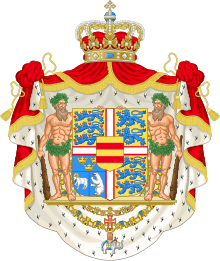Prince Nicholas of Greece and Denmark
| Prince Nicholas | |
|---|---|
| Prince Nicholas of Greece and Denmark | |
 | |
| Born |
22 January 1872 Athens, Kingdom of Greece |
| Died |
8 February 1938 (aged 66) Athens, Kingdom of Greece |
| Burial | Royal Cemetery, Tatoi Palace, Greece |
| Spouse | Grand Duchess Elena Vladimirovna of Russia |
| Issue |
Olga, Princess Paul of Yugoslavia Princess Elizabeth, Countess of Toerring-Jettenbach Princess Marina, Duchess of Kent |
| House | Glücksburg |
| Father | George I of Greece |
| Mother | Olga Constantinovna of Russia |
| Religion | Greek Orthodox |
Prince Nicholas of Greece and Denmark (22 January 1872 – 8 February 1938), of the Glücksburg branch of the House of Oldenburg, was the fourth child and third son of George I, King of the Hellenes, and of Queen Olga. He was known as "Greek Nicky" in the family to distinguish him from his paternal first cousin Emperor Nicholas II of Russia. Prince Nicholas was a talented painter, often signing his works as "Nicolas Leprince."
Marriage and issue
He married Grand Duchess Elena Vladimirovna of Russia (1882–1957), daughter of Grand Duke Vladimir Alexandrovich of Russia and Marie of Mecklenburg-Schwerin, the only sister of the future Russian imperial pretender, Grand Duke Cyril Vladimirovich, and his second cousin through his mother Olga Constantinovna of Russia and her father Vladimir Alexandrovich of Russia, on 29 August 1902 in Tsarskoye Selo, Russia. [1]
They had three daughters:
- Olga (1903–1997). Married Prince Paul of Yugoslavia.
- Elizabeth (1904–1955). Married Count Carl Theodor of Toerring-Jettenbach.
- Marina (1906–1968). Married Prince George, Duke of Kent.
The Princesses were raised with an English nanny, Kate Fox, known as "Nurnie". [2]
Public life
Along with his brothers Constantine and George, Nicholas helped to organize the 1896 Summer Olympics in Athens, the first to be held since 393. Nicholas served as president of the Sub-Committee for Shooting.
His father bequeathed him the Royal Theater of Greece which Nicholas, in turn, transferred to the Greek state in 1935. He was friends with George Simitis and was godfather to his son, future socialist Prime Minister Kostas Simitis.[3]
Death and burial
Prince Nicholas died in Athens on February 8, 1938 and was buried in the Royal tomb at the Palace of Tatoi.
Titles, styles, honours and arms
Titles and styles
- 22 January 1872 – 8 February 1938: His Royal Highness Prince Nicholas of Greece and Denmark.
| Styles of Prince Nicholas of Greece and Denmark | |
|---|---|
 | |
| Reference style | His Royal Highness |
| Spoken style | Your Royal Highness |
| Alternative style | Sir |
Honours
Foreign Honours
-
 Spain : Cross of Naval Merit -with White Decoration- (January 1892).[4]
Spain : Cross of Naval Merit -with White Decoration- (January 1892).[4] -
 United Kingdom : Honorary Knight Grand Cross of the Royal Victorian Order (GCVO) (August 1901).[5]
United Kingdom : Honorary Knight Grand Cross of the Royal Victorian Order (GCVO) (August 1901).[5]
Ancestry
References
- ↑ "Historic royal portrait miniature brooch". Christies.
- ↑ "photographs of members of European royalty, together with several postcards, relating to the royal nanny Kate Fox". Bonhams.
- ↑ Markezinis, Spyros (1994). Political History of Modern Greece (in Greek).
- ↑ Gaceta de Madrid: no. 28. p. 292. 28 January 1892.
- ↑ The London Gazette: no. 27346. p. 5409. 16 August 1901.

